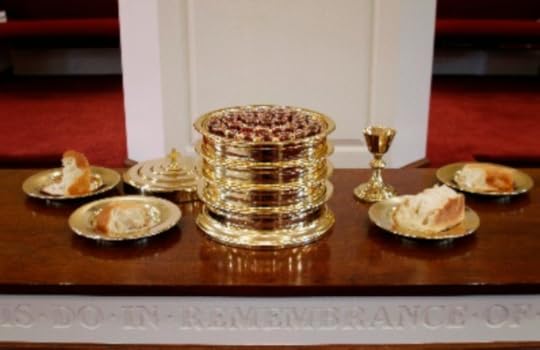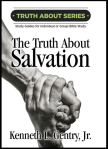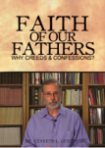PROPER COMMUNION (5)
 PMW 2024-085 by Kenneth L. Gentry, Jr.
PMW 2024-085 by Kenneth L. Gentry, Jr.
THE NECESSITY AND BENEFITS OF CAREFUL FENCING
In this five-part series, which I am concluding, we have studied the biblical argument for proper fencing of the Lord’s Table. In highlighting that argument we have noted its significance for the integrity of the church as the kingdom of Christ and as a means of establishing the church’s governmental authority. As we reflect upon the matter further we may note the necessity of careful fencing from other angles.
First, the failure to properly fence the Table encourages sin
If we allow Christians who refuse to join a church to partake of the Lord’s Supper we are encouraging them in their sin against Christ and his church. Christ established his church, gave it officers, and appointed (through his apostles) election and ordination as the means for securing its officers. And this can only be done by formal members in a church: electing church officers is surely not open to visitors. And intentionally remaining outside of membership in a local church makes it impossible for believers to “obey your leaders, and submit to them” so that they might “keep watch over souls” (Heb 13:17). Again, as Paul states: he has no authority over those outside (1 Cor 5:12). Obviously Christ intended that his followers formally commit to a church through membership.
Now, we must understand that the new covenant church is rooted in, built upon, and continuous with old covenant Israel (Rom 11:16–18; Eph 2:11–22; Rev 21:12, 14). In fact, Christ’s establishing of the Lord’s Supper itself demonstrates the continuity between the old and new covenant communities (as even our own doctrinal statement declares). After all, Jesus established the Lord’s Supper in the very context of the Passover (Luke 22:15–20), thereby linking the Lord’s Supper with the Passover as its non-bloody fulfillment. Furthermore, he applies the “new covenant” to all partakers of the Lord’s Supper (Luke 22:20; cp. 1 Cor 11:25) even though it was prophesied for Israel: “‘Behold, days are coming,’ declares the Lord, ‘when I will make a new covenant with the house of Israel and with the house of Judah’” (Jer 31:31).
Three Views on the Millennium and Beyond
(ed. by Darrell Bock)
Presents three views on the millennium: progressive dispensationalist, amillennialist, and reconstructionist postmillennialist viewpoints. Includes separate responses to each view. Ken Gentry provides the postmillennial contribution.
See more study materials at: www.KennethGentry.com
When we look into the old covenant regulations governing the Passover we discover that only those who were formally “members” of Israel’s covenant community could partake — and not those who were just members “in their hearts.” Before one could partake the Passover (the old covenant counterpart to the new covenant Lord’s Supper) he must accept circumcision, thereby becoming a member of Israel:
“The Lord said to Moses and Aaron, “This is the ordinance of the Passover: no foreigner is to eat of it . . . . But if a stranger sojourns with you, and celebrates the Passover to the Lord, let all his males be circumcised, and then let him come near to celebrate it; and he shall be like a native of the land. But no uncircumcised person may eat of it.” (Exo 12:43, 48).
Obviously, the foreigner dwelled in Israel among the Jews, for the text states that he “sojourns with you.” As a sojourner living in Israel he was somewhat like one who visits a church but never joins. And just as obviously the foreigner exercised faith in the God of Israel, for otherwise why would he want to partake of the Passover ? After all, it expressly pictured God’s deliverance of Israel from bondage by her exodus from Egypt. In fact, we learn regarding its institution in Exodus 12:
“‘And it will come about when you enter the land which the Lord will give you, as He has promised, that you shall observe this rite. And it will come about when your children will say to you, ‘What does this rite mean to you?’ that you shall say, ‘It is a Passover sacrifice to the Lord who passed over the houses of the sons of Israel in Egypt when He smote the Egyptians, but spared our homes.’” (Exo 12:25–27)
Thus, OT scholars note that “the Exodus was the redemptive event par excellence in the life of God’s covenant people. The Passover reenacted annually the greatest miracle Yahweh performed out of grace for His chosen; it was to become the focal point of Jewish history. The Passover celebration retold the story of freedom after more than four hundred years of Egyptian bondage” (International Standard Bible Encyclopedia2 3:676).
Furthermore, the uncircumcised was not allowed to enter the temple sanctuary to partake of temple sacrificial-feasts, as we learn in Ezekiel’s vision of the eschatological temple:
“And you shall say to the rebellious ones, to the house of Israel, ‘Thus says the Lord God, ‘Enough of all your abominations, O house of Israel, when you brought in foreigners, uncircumcised in heart and uncircumcised in flesh, to be in My sanctuary to profane it, even My house, when you offered My food, the fat and the blood; for they made My covenant void — this in addition to all your abominations. And you have not kept charge of My holy things yourselves, but you have set foreigners to keep charge of My sanctuary.’‘ Thus says the Lord God, ‘No foreigner, uncircumcised in heart and uncircumcised in flesh, of all the foreigners who are among the sons of Israel, shall enter My sanctuary.” (Eze 44:6–9).
But now a problem arises for those who refuse church membership but who want church benefits: Clearly this foreigner’s simply being among the Jews and his having faith (shown by his desire to partake) were not sufficient: he had to take the extra, formal step of becoming a “member” of Israel through circumcision. He had to become “like a native of the land” before he could partake — even though he was racially non-Jewish. Genesis 17:14 warns that to fail to undertake the sign of circumcision results in one’s being cut off from the visible community: “But an uncircumcised male who is not circumcised in the flesh of his foreskin, that person shall be cut off from his people; he has broken My covenant.” Circumcision was an external sign of internal commitment (Deut 10:16; 30:6). By parity of reasoning the same expectations should be true in the New Testament regarding the Lord’s Supper being reserved for baptized members of the church.
But we have more than analogy and historical connection with Israel to direct us in this matter. Scripture teaches that membership in the visible church is an obligation upon all who profess faith in Christ. The church is not an optional society, but an obligatory institution for the Christian. In fact, in Scripture we have grounds for a formal church membership roll, as we may discern from the following:
(1) The concept of a heavenly roll in the Book of Life provides the theological foundation for a church roll (Exo 32:32–33; Dan 12:1; Luke 10:20; Phil 4:3; Rev 13:8; 17:8; 20:12, 15). This is underscored by the OT emphasis on genealogy within Israel (see previous references).
(2) Scripture speaks of members as being “numbered” among others, which reflects the concept of a church roll (Acts 2:41, 47; 6:7; 1 Tim 5:9). Are those who simply visit a church “numbered” in the church? This would mean any and all visitors would be numbered in the church and may therefore vote for church officers and even undertake office themselves. This also strongly implies that those who never attend church are not “numbered” in the church, even though they may profess faith in Christ. This gives new — and erroneous — meaning to the concept of the “invisible” church.
Tongues-speaking: Meaning, Purpose, and Cessation
 by Ken Gentry
by Ken Gentry
The position presented within is that tongues-speaking allowed the gift person to speak in a known human language without previously knowing it; tongues brought inspired revelation from God; the gift was a sign confirming the apostolic witness and warning of the coming destruction of Jerusalem; and therefore the gift ceased in the first century.
See more study materials at: www.KennethGentry.com
(3) Members can be removed from the church (Matt 18:17; 1 Cor 5:2), which surely requires the keeping of a roll so that they might know who is within and who is without its bounds. After all, how can people be removed from a church if they are not members of it? Indeed, Christ promised to establish his church (Matt 16:18) and he gave it “keys” for entering and exiting it (Matt 16:19). These keys involved disciplinary powers whereby people could be removed from it (Matt 18:15–17).
(4) For elder-overseers to formally care for their flock requires that the flock be known, as by a roll (Heb 13:7, 17–18; 1 Thess 5:11–14; 1 Pet 5:2; Acts 20:28). This is especially significant in that officers of the church have no authority over those outside (1 Cor 5:12) which requires that they know who is inside.
(5) The New Testament records instances of letters being written to commend individuals to other bodies, which provides the basis for modern transferring of letters (Acts 18:27; Rom 16:1–2; 2 Cor 8:16–24).
And once again: since God’s word ordains elders in the church (1 Tim 3; Tit 1) who would elect these elders if there were no formally-approved membership? Regular visitors? Occasional visitors? Outsiders? How can its leaders “keep watch over your souls” if there is no membership who must “submit to them” (Heb 13:17) and over whom they are overseers?
By allowing non-members of Christ’s church to partake of his Supper, the church is allowing the theoretical possibility that all professed Christians could avoid church membership. But then where would the church be? If the highest censure of the church is excommunication, but Christians may legitimately avoid being members of the church, then this power is without significance. And if the church had no members over time, no one would have the authority to insure proper doctrine. Christianity would be reduced to a random assortment of personal, competing beliefs and faith claims with no continuity through history.
Furthermore, by not requiring membership in a church for partakers of the Lord’s Supper, we are discouraging professed Christians from coming under spiritual oversight and governmental authority. This allows them to avoid responsibility and accountability — on the basis of our own practice. Thus, this encourages people to sidestep responsibility in the church while they enjoy the benefits of the church. This is ultimately detrimental to their spiritual growth.
From its very institution the Lord’s Supper is a formal, public, corporate act of Christian fellowship, not a personal action unilaterally governed by the individual. Both the integrity and purity of this act of fellowship must be guarded through accountability to a local church. Allowing those who are not formal members of a church to partake involves the church in a strange situation: it welcomes those to partake the Lord’s Supper who voluntarily determine to live in the very place that excommunication casts those who are brought under the church’s severest discipline: outside the church (Matt 18:17; 1 Cor 5:4–5, 12–13)!
To make matters worse, such a tolerance of non-member partaking is detrimental to the life of the church itself. For in principle we effectively undermine all church discipline (which Christ has ordained, Matt 18:17) in that if one may partake the Lord’s Supper without any formal membership in that church, then how shall discipline function? Who exercises discipline? Who is disciplined? Again, Paul says he has no authority over those outside the church (1 Cor 5:12). But this is precisely where non-members dwell.
Second, inefficient fencing encourages individualism, thereby discouraging true Christian society
The Lord’s Supper expresses the unity of the body of Christ: “Since there is one bread, we who are many are one body; for we all partake of the one bread” (1 Cor. 10:17). But those who refuse to join the church and be united with other believers are breaching an important element expressed in the Supper: the Christian’s corporate unity.
Jack Stotts comments:
“Perhaps one of the greatest challenges to the corporate view of the church in the United States, and possibly in the world” is individualism which reflects “a view of the self and community where the community drops away or recedes so far into the background that only the separate and self-reliant individual comes into focus. This self is the individual who has no necessary relationships of mutuality, whose individual accomplishments overshadow the sense of gifts received, where one ‘makes it’ alone or not at all, where consuming goods takes precedence over public responsibility.” (Encyclopedia of Reformed Theology, p. 72)
Presbyterians are opposed to independency. Sadly, our age is a “do-it-my-way” mode of thinking where everyone is his own authority. This does not mesh with a biblical conception of being united with others — and under authority and obligations. The Roman Catholic Church has as one of its major critiques of Protestantism that it has fragmented the church allowing every individual to become a law unto himself. As Presbyterians we should not encourage such. The Christian should be under authority by becoming a vow-taking member of a local church. To fail to warn individual Christians in this regard bows to the rampant individualism in our society.
Sadly, we live in a time and culture where the personal faith of the individual Christian too easily and cavalierly roots out any obligation to his being a member of a body of believers. This erodes covenantal relationships while endorsing self-oriented individualism. Too many evangelicals so emphasize the personal relationship with Christ (which is important, to be sure) that it leads to an individualism detached from any accountability to others. As a logical extension of this way of thinking, the decision to participate in the Lord’s Supper is deemed a matter of purely personal responsibility with no corporate obligations.
 The Truth about Salvation By Ken Gentry
The Truth about Salvation By Ken Gentry
A study guide for personal or small group Bible study. Deals with the Christian doctrine of salvation from a Reformed theological perspective. It opens with a study of God as loving Creator, the shows how the first man fell into sin. Shows God’s righteousness requires that sin be dealt with. Presents Jesus as both God and man so that he can be man’s Savior. Includes review questions and questions for further study.Twelve chapters are ideal for one quarter of Sunday School.
See more study materials at: www.KennethGentry.com
R. Scott Clark rightly warns that:
“Americans (or at least American evangelicals) are an autonomous, egalitarian, rebellious, and independent lot. It is a fundamental assumption of American evangelicals that, having entered into a personal, private relationship with the risen Christ they are entitled to commune in any and every visible, institutional church they will. . . . They consider it their birthright to act as if they are members of all congregations, even if they submit to the discipline of none and certainly not to the congregation where they hope to commune.” (Clark, “Fencing the Table or the Scandal of the Church” (www.heidelblog.wordpress.com).
If we leave the matter of communion solely to the discretion of the unattached individual, we are acting in a spiritually dangerous fashion that can negatively impact not only that individual but the church that allows such individualism. Such a practice assumes an individual’s competence to judge spiritual matters even though he may be a stranger to the teaching of Scripture on communion. Many people today define themselves as Christians without the least biblical understanding of what a genuine Christian is. After all, the Bible warns us that the heart is deceitful and that sin easily confuses men (Jer 17:9; Rom 7:11; 2 Cor 11:3; Eph 4:22; Heb 3:13). Since the Lord’s Supper has a potential for negative sanctions (1 Cor 11:17–34) our obligation as elders is to assist potential partakers in avoiding such sanctions, as well as to keep the Lord’s Supper pure and holy because of what it represents (1 Cor 10:16). Surely we would rather err on the side of caution (if such were error) rather than on the side of openness. Do we want to participate in another’s sin? Our concern involves appropriate, active pastoral care.
What is more, some who profess Christ live in open sin, and yet present themselves as brothers: “if any man that is called a brother be a fornicator, or covetous, or an idolater, or a railer, or a drunkard, or an extortioner; with such an one no not to eat” (1 Cor 5:11). Yet on the individualist principle of communion, such “so called” brothers would be allowed to partake because they are an authority to themselves, lacking any formal, spiritual oversight to challenge, rebuke, correct, instruct, and guide them.
We see in Scripture several occasions in which people came to Jesus professing to be believers. And in their own minds they surely conceived themselves to be believers. But Jesus looked into their hearts and exposed them in their error.
“Now when He was in Jerusalem at the Passover, during the feast, many believed in His name, beholding His signs which He was doing. But Jesus, on His part, was not entrusting Himself to them, for He knew all men, and because He did not need anyone to bear witness concerning man for He Himself knew what was in man.” (John 2:23–25)
“Jesus therefore was saying to those Jews who had believed Him, ‘If you abide in My word, then you are truly disciples of Mine; and you shall know the truth, and the truth shall make you free . . . .’ They answered and said to Him, ‘Abraham is our father.’ Jesus said to them, ‘If you are Abraham’s children, do the deeds of Abraham. But as it is, you are seeking to kill Me’” (John 8:31–32; 39–40)
Thus, when acting on their own, they deemed themselves believers. But Jesus acted in his authoritative capacity to expose their delusion. This is the function of the officers of the church who are also to examine professing believers to see if they are genuine believers (though lacking Christ’s divine insight). We see this in the fact that whenever someone wants to join the church, the officers examine them so that they may properly evaluate their testimony of faith (though we cannot claim Christ’s infallible perception).
What if a Mormon came to a church that did not engage in fencing the table? He is a member of the Church of Jesus Christ, Latter-day Saints, which has as its distinctive apologetic an “apologetic of the heart.” This Mormon would vehemently claim that he “believes” in Jesus. Yet we should immediately recognize that we cannot allow a Mormon to partake of communion (he is a polytheist with horribly corrupt, heretical views of God and Christ). What if a Roman Catholic came as professing believer? But if we should forbid a cult member or a Roman Catholic, then we have fenced the table. We have fenced the table the table by forbidding cultic or heretical doctrine and adherents to that cultic or heretical doctrine.
Faith of Our Fathers (DVDs by Ken Gentry)
Explains the point of creeds for those not familiar with their rationale.
Also defends their biblical warrant and practical usefulness for defending historic, Christian orthodoxy in our heterodox world.
See more study materials at: www.KennethGentry.com
Third, by not giving a word of fencing, we undermine discipline in the church
If we do not state that those who have been subjected to discipline should not partake, then we actually undermine the legitimacy of church discipline. We do this in allowing someone who has been disciplined in his local church (or disciplined out of his local church by excommunication) to partake of the Lord’s Supper in ours. This is spiritually dangerous, for if we leave it to a visitor’s uninformed, uninstructed , or even seared (1 Tim 4:2) conscience to decide whether he should partake, he may not understand the significance of what he is doing. (Of course, we recognize that even in our attempt at fencing the table we cannot stop the determined non-regenerate false-professor of Christ from partaking — because we lack Christ’s perfect knowledge.)
Fourth, the problem of baptized children
If we do not fence the table by requiring formal, communicant status membership (our fencing statement reads: “those who have been approved by church officers”): What about our young children who have not met with the elders to be approved for communicant status? May they determine that they are believers and partake, though not yet admitted to the Table by the elders? Such is the logic of opposition to fencing the table in terms of formal church membership.
CONCLUSION
The purpose of this study was to present, explain, and defend a four-fold fencing statement. In brief, our fencing statement requires that a participant in the Lord’s Supper must be:
1. a believer in Christ
2. baptized in his name
3. a member in good standing of an evangelical church
4. formally admitted to the Lord’s Table by ordained church officers of an evangelical church.
This fencing effort is important because Reformed Christians deeply believe: “Is not the cup of blessing which we bless a sharing in the blood of Christ? Is not the bread which we break a sharing in the body of Christ?” (1 Cor 10:16).
Click on the following images for more information on these studies:



Kenneth L. Gentry Jr.'s Blog
- Kenneth L. Gentry Jr.'s profile
- 85 followers



